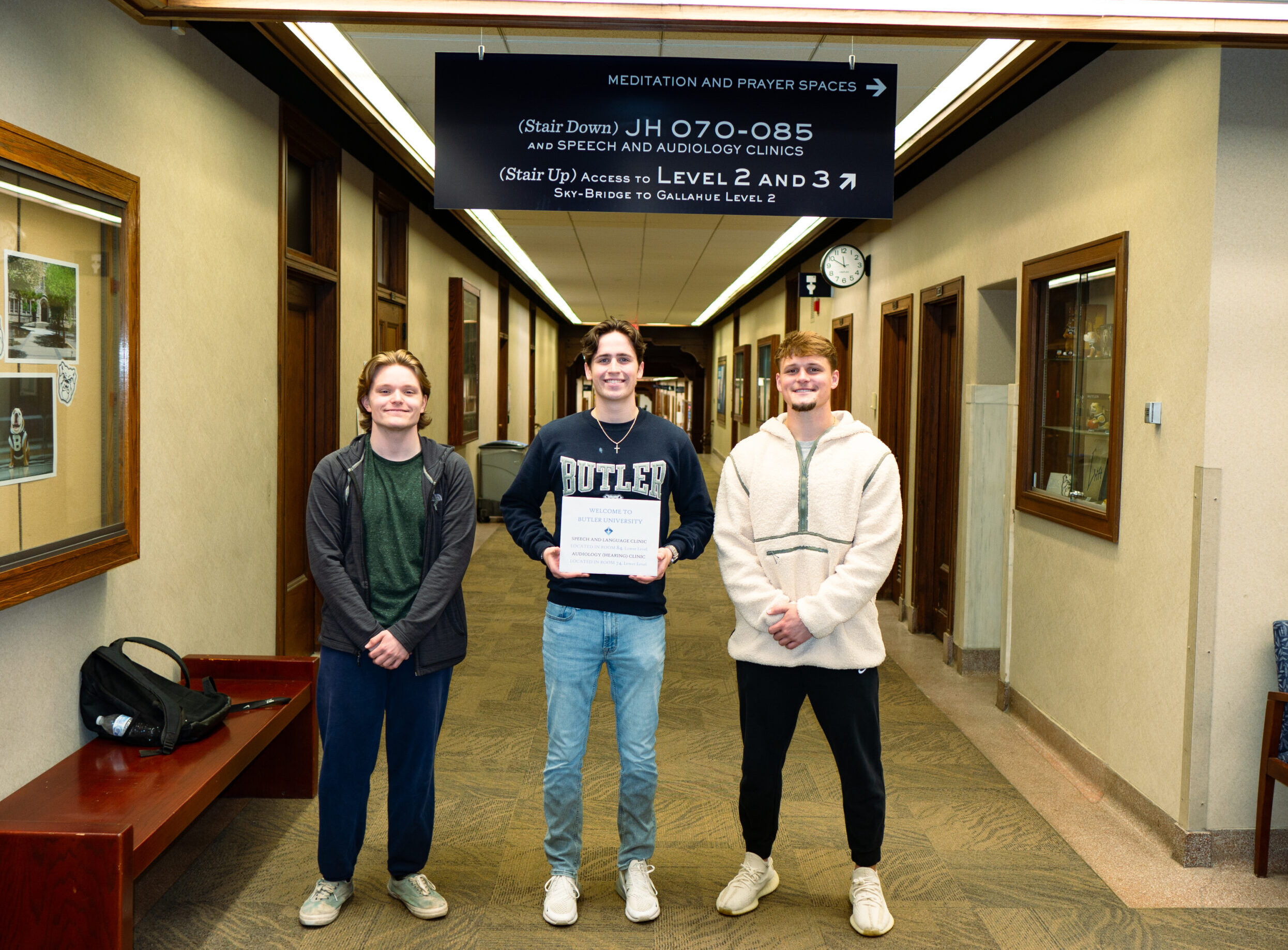Lucas Bornman (left), Luke Meyer (middle) holding the SLHS department sign and Luke Wooten (right). Photo by Jonathan Wang.
TIFFANY HOANG | CULTURE REPORTER | thoang2@butler.edu
The speech, language and hearing sciences (SLHS) field is an area of academic study centered around investigating the biological, physical and psychological processes of communication. Using evidence derived from those investigations, methods are developed for diagnosing and treating individuals with speech, language and hearing conditions. Students in the SLHS department at Butler appreciate the close-knit community within the department as they can build relationships with their peers and faculty very quickly. However, upon closer inspection, those relationships consist mainly of women. The SLHS field worldwide has a gaping gender disparity.
Both at Butler and in the workplace, there is an enormous gender gap within the SLHS field. The department at Butler is already small with only 115 students. However, there are only three men in the major, all coincidentally named Luke.
The U.S. Bureau of Labor Statistics recognizes the SLHS field to have significant growth in the upcoming years. There is a growing need for more SLHS workers overall. This field is dominated by woman-identifying workers. This gender gap all stems from the stereotype that women are more nurturing and better suited for being educators. Butler’s SLHS department would like to challenge that.
Ann Bilodeau, a clinic director for the SLHS program who has been at Butler for 12 years, praised the different abilities and mindsets men can bring to the table.
“Men can do it too,” Bilodeau said. “We have very few males in our department, but I love hearing their perspectives. I find them to be amazing. They have a love for working in this area. There is something special about them.”
Junior SLHS major Luke Wooten loves how tight-knit the department is.
“It takes a special type of person to be an SLHS major,” Wooten said. “We make great connections with faculty and peers. Because the department is so small, we basically have to do everything together.”
Though they claim it is not a barrier to success, the three Lukes of the department have all felt the effect of being the only man in the department for their year.
First-year SLHS Lucas Bornman appreciates the edge his gender gives him within the field.
“As long as you have the expertise in working and being able to fulfill your job duties, [gender] doesn’t matter,” Bornman said. “I see no hindrance at all. At first, it was a little odd. It doesn’t matter because I kind of prefer it like that. It feels like you’re a little different.”
When it comes to this career, the SLHS department claims that the gender of the provider is not the most important thing. Instead, it is the quality of service that makes a difference. Effective communication and the passion for helping others are what matters most. For some patients, seeing a provider that is different from the usual makes them feel more comfortable with their services.
The last of the Lukes, senior SLHS major Luke Meyer, sees his gender as a benefit for his career.
“One, we’re used to [being the only men],” Meyer said. “Two, it can be a strong suit now, but it makes you stand out a little bit. Not at all in a bad way. I think it’s definitely not a hindrance anymore, but I was a little intimidated coming into the program. But that’s not what’s important when you go into this. You’re serving others.”
With that being said, the SLHS department still encourages more men to join. Within the field, nearly 95% of pathologists are women, and 5% are men. However, in pediatrics, developmental disorders primarily affecting communication, speech and language skills are more frequent in boys. Patients need to experience diversity represented in their providers.
Bilodeau has seen the impact of having a male clinician over her years as a speech-language pathologist.
“We have children who need to have that role model, just like in every [group],” Bilodeau said. “I [just told] Luke [Meyer] that this Wednesday, the client that he had last fall is being seen by a woman [provider] now. They’re doing great, and he [asks about Luke] all the time. He definitely remembers [Luke]. Even this week I had one of my clients remember Zach who was a [student clinician] from a few years ago. It just seems to be a very memorable [experience] because it’s different.”
The SLHS department inferred that the gender stereotypes surrounding the field are what hold men back from pursuing SLHS. Men are told they are not nurturing enough to succeed in these careers. However, the department disagrees.
Meyer hopes more men will take a chance on SLHS — without a doubt, they will succeed greatly.
“We encourage men who are unsure of what they want to pursue to keep an open mind [about SLHS],” Meyer said. “Like Luke [Wooten] said earlier, if you are someone who just wants to help people, is compassionate and caring and needs to have a human connection with strong interpersonal skills, this is certainly a field for you. It’s incredibly rewarding at that.”
Even if there is uncertainty if SLHS is the right fit, it is certainly worth a shot for those who enjoy face-to-face human interactions and helping to improve the lives of others. It is not just a field for extroverts. Any guy can join.
“Even if you’re more reserved, you’ll still fit right in with us,” Meyer said.
And don’t worry. Being named Luke is not a requirement.



